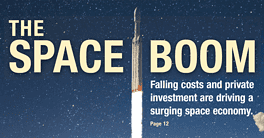VOL. 38 NO. 11

The big news of the last few weeks is Donald Trump’s victory in the US presidential election, accompanied by a clear Republican majority in the US House of Representatives and the Senate. We know the results, but the new administration will only start working as of next month.
We also know the new administration’s announced programs, priorities, and key nominations for the new cabinet. However, other big questions remain: How quickly or slowly will the new administration implement key parts of Trump’s agenda? We are talking about tariffs, the US debt ceiling, the deportation plans for undocumented immigrants, and the future of NATO, to name a few.
It is too early to answer all these questions, as it is too early to guess if the appointments that require Senate confirmation votes will be conducted quickly and smoothly. In addition, many of the key appointees have different opinions on key policy issues: Will they get along? Is the new administration capable of working together and meeting its goals without adding to major international tensions?
We will cover the issues extensively in the new year. These questions are at the top of every boardroom and on the agenda of every executive worldwide. In some cases, they require anticipatory moves, like the ones of food importers in the US who decided to buy extra products in the last few months to avoid possible future tariffs.
The focus on supply chain and the role of artificial intelligence, the topic of this month’s cover story, is our contribution to analyze one of the key areas that could be affected in the coming months by new policies in the US. They are also an area that underwent dramatic changes due to the post-pandemic economic climate. Finally, in this issue, among other features, we present our annual private banking awards and the global winners of our Best Digital Banks Awards.

Andrea Fiano | Editor at Large
afiano@gfmag.com

